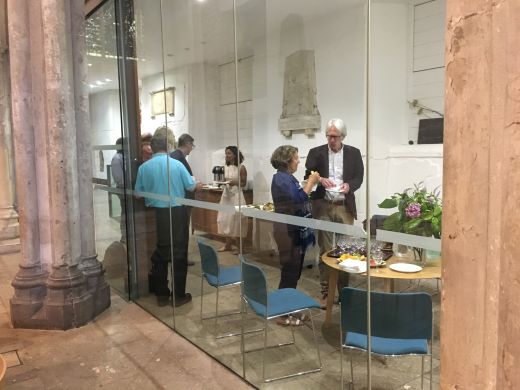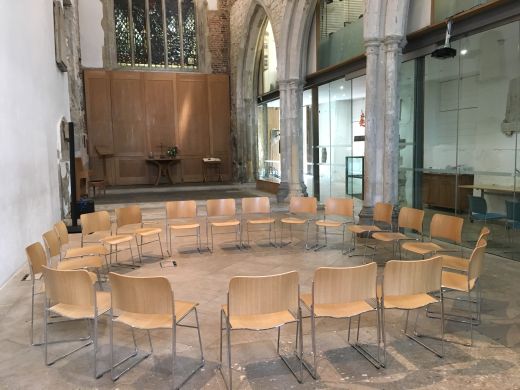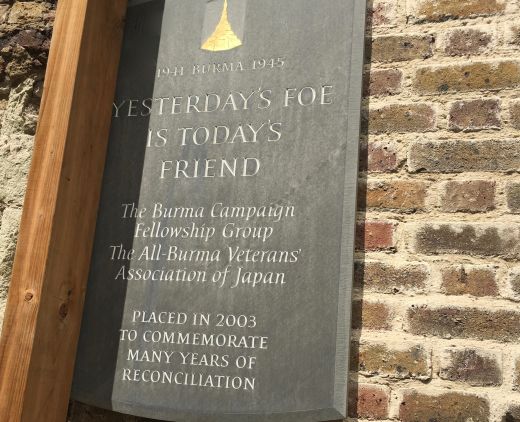Simon Duffy reflects on the intellectual and practical challenge facing thinkers opposed to the current neoliberal consensus.
Author: Simon Duffy
Recently I took part in a workshop that I’d helped to organise, along with Professor Jo Wolff of the Blavatnik School of Government, of the University of Oxford and Dr Henry Tam, of the University of Cambridge. We wanted to bring thinkers from the Left together to explore how best to articulate an alternative to neoliberalism. Could the Left do, what the New Right once did, and break through the current intellectual consensus which sees the market as the answer to every human problem? Could we help people see that an attitude of mutual care and inclusion is a better than a world built on selfishness and exclusion?
Perhaps inevitably, such a meeting could only be held in London, and I had booked as the venue, St Ethelburga’s Centre for Reconciliation and Peace, which is right in the heart of the City of London. As I came out of the tube station at Liverpool Lime Street I looked out at all the excess and wealth and I wondered:
“Have we arrived in the Marxist utopia of super-abundance, without knowing it? Are we in heaven - but we behave like we’re in hell?”

The entrance to the church was hard to find - but my iPhone guided me there. It was like a tiny crack in the side of capitalism: a little alleyway, flanked by enormous shining tower blocks (What do they really do inside these buildings?!) which led into a beautiful garden. From there you could turn into the nave of the old church. The church had been resurrected, after the Bishopsgate bombing in 1993 and, as one little plaque described, hoping against hope, resources were eventually found to convert the church into a memorial and a place for people to meet and think.

I cannot do justice to the range of thought, strategy and insight explored in the meeting. Although clearly we were all struggling to distinguish the whole elephant in the room from our own particular perspective. That is natural enough, especially when people come together for such a short period of time.
We clearly do not need a new ideology - as Arendt accurately describes it - ideologies are ideas gone mad. There is no one theory, practice or strategy that will help us solve our problem: to turn our society away from the path of injustice, intolerance and exclusion down which it now seems to be jogging.
Yet - yet I still felt that there was something a bit simpler - missing from our thinking.
My work at the Centre for Welfare Reform means I know of many practices that could be part of a better future and in the event I got the chance to hear of many more that also sound promising - but I don’t think we’ve worked how to describe them in ways that are clear enough or attractive enough to the wider community. They don’t seem to fit into any larger picture; or perhaps they fit into older pictures, but ones that no longer describe our current reality.
We also deployed many valuable concepts: social rights, the commons, citizenship, cooperation, community, democracy, equality, freedom, justice. We do not lack powerful traditions of moral thought on which to build a better future. But can we order these ideas in ways that have real rhetorical impact? Being right is not enough, we also need to persuade, and that means understanding the concerns and perspectives of others - who often see things differently.
I do not mean we need one of those dubious acts of political branding that have been so prevalent (although with a rapidly diminishing rate of return): New Labour, Red Tory, Big Society, Blue Labour. Although each of these hints at something true, they are also too contrived and hollow to really help us. Compass have usefully settled on the Good Society as its goal, and this does seem helpfully inclusive. But to me it also lacks the edginess needed to wake people up to what is possible. It is a perhaps good tent - but perhaps not a good lever for turning the world.

Henry Tam reminded us of what lay behind the emergence of the New Right from the 1960s onwards, particularly in the US: An alliance was purposefully developed to establish common ground between:
There is perhaps no logical connection between the freedom to exploit, the freedom to fight and the freedom to bigotry - but as a coalition of somewhat divergent forces they have been quite effective of pivoting us away from the path that so many on the Left had thought had been secured in the years following World War II.
Today our task is to explore what might bind together a new coalition for justice. But if that is so then we must also remember too that this New Right alliance did not just offer a different point of view, it actively exploited weaknesses in the post-war consensus and traded on its own assumptions. For example, the New Right built on many of the more dubious assumptions of the post-war consensus:
In addition the New Right exploited some of the cracks in socialism. For instance, the welfare state was a great achievement, but for many it became an institutional impediment to their own aspirations. Disabled people wanted control over their own lives and the support they needed - not institutional care. Working class people - like my grandparents - wanted to buy their home and to pass something on to their children. Ordinary people, in their role as consumers, did not like the inconvenience of strikes and questioned the quality of some of what they received from the public sector.
I know that we were fooled. We were given jam today, but in the long-run of many tomorrows, we’ve seen a radical deterioration in the quality of public services, reduced employment rights and growing inequality. But it is important to recognise that the New Right were not just offering an alternative - they were offering a critique of the powers that confronted them. They were tapping into different aspects of our humanity - being a consumer, a home owner, a parent and independent adult - rather than just a worker.
Another way of making this same point is - we can’t go backwards - we can’t simply turn the clock back to older conceptions of justice and to older coalitions of forces - because we got here from there.
Now there does need to be something new.

So I think we should accept Henry’s challenge and we should think hard about:
To my mind we must start by thinking about the challenge of justice afresh. We must abandon, or considerably revise, one of the most important rhetorical and practical strategies that has been central to the Left’s approach since the nineteenth century. Hannah Arendt, accurately outlines the central achievement of Marxism as follows:
“What Marx understood was that labour itself had undergone a decisive change in the modern world: that it had not only become the source of all wealth, and consequently the origin of all social values, but that all men, independent of class origin, were sooner or later destined to become labourers, and those who could not adjust to this process would be seen and judged by society as mere parasites. To put it another way: while others were concerned with this or that right of the labouring class, Marx already foresaw the time when, not this class, but the consciousness that corresponded to it, and to its importance to society as a whole, would decree that no one would have any rights, not even the right to stay alive, who was not a labourer. The result of this process of course has not been the elimination of all other occupations, but the reinterpretation of all human activities as labouring activities.”
from Hannah Arendt, Karl Marx and the Tradition of Western Political Thought
This seems to be profoundly helpful way of understanding what went on at the end of the nineteenth century and the assumptions that have become central to the modern picture of political and economic reality. Labour became not only an organising principle for the Left (trade unionism) but also an organising principle for the welfare state: jobs, services (more jobs) and income security based on employment status.
It also seems to be a profoundly helpful way of understanding where we’ve gone wrong.
This week was a particularly thought-provoking week for me. The day before our philosophical event I’d been lucky enough to participate in a workshop with Guy Standing, who has identified the emergence of the precariat - the growing number of us who must survive without secure employment, on low incomes and uncertain social status. Instead of more and more of us being folded into an increasingly powerful working class, now more of us are being separated out, like oil from water, into distinct layers, beyond the edge of the meritocratic centre.
Economically, it is not just the mysterious 1% who gain from the new world order. It is the top 15% of earners who have seen their relative incomes increase significantly over the past 40 years. This group - whom Standing calls the salariat - include many working in public services, education and the private sector. It is this group who effectively control the distribution of power and money - always tempted to centralise things a little more - always tempted to reward themselves a little more.
International data also reminds us that, amongst the Western welfare states, it is the anglo-saxons who have gone furthest and fastest down the path of injustice. Some of the likely factors that have helped halt the slide in Europe include: stronger trade unions and more proportional electoral systems. These are important factors to consider - but this also reminds us that the trade union movement has typically been wedded to a labour-first model which is looking increasingly unsustainable.
For someone like me, living outside the normal patterns of employment, there is no trade union to join and as far as I could see trade unions don’t seem to represent me, nor fight for those who are most excluded from society. It was for this reason I joined Acorn, a union for the poor. Political organisation is clearly vital - but we must surely include everyone excluded from citizenship and everyone who has a limited chance to a secure their own livelihood.
My instinct - for want of a better word - is that rejection of the labour-first model must be a pivot issue - it is certainly a pole to which I want to cling. I do not want to start by gently amending our economic and political models to make them more amenable to the labour-first model - to make them more inclusive: Secure jobs for refugees! Secure jobs for disabled people! Secure jobs for everyone!
I can see the appeal at some level - but think this approach will lead us down a terrible dead-end.
Our broken economic system of redistribution reflects facts about how technology is changing our world. Forms of income that once seemed secure are vanishing. Economic power rests with those who control the technology. Even if we wrest economic control back from the current elite (and this is of course an important strategy) do we really want to go backwards to restore the old order? Greater productivity should surely release us to enact to higher forms of value - to be creative, to be caring and to be full citizens - fully engaged in the life of our communities. This is why, in my opinion, something like universal basic income must be part of any new settlement.
In my own experience there seem to be many in the precariat who are consciously turning their back on the idea that aspiration and achievement is measured by our salary. In Sheffield, James Lock, co-founder of Opus Independents, recently explained to me that his goal after university was to do things that created or shared meaning. He did not find this in the jobs on offer to graduates - so he created a new organisation which served what seemed important to him. Citizenship and the search for meaning, not wealth, must be critical to building a more sustainable vision of the future.

What meaning requires is the commons. The places where people can meet, talk, interact and create new forms of value. In Athens this was the function of the agora - but in the modern world we have allowed the agora to be colonised and controlled. Not only has the market stolen much of our public domain (although this theft is often described as investment) the public sector is also increasingly a closed place: a professionalised bureaucracy - not the domain of citizens. The commons is squeezed out between the market and the state.
And it is not just the human spirit that is endangered. The planet cannot afford for us to think that all economic growth is good and that digging and re-filling holes (to borrow Keynes’ image) is sufficient to ensure well being for all. How we take care of our planet, the animals, the plants, and how we protect public and natural spaces must be a central questions in any sane twenty-first century. One of our primary civic duties must surely be to care for the natural world as a distinct and essential good.
In addition, and of particular concern to me, is the way in which society seems to have become increasingly hostile to the outsider, to the person coming from outside national boundaries, to the person who is too different, too disabled or too strange. I know that some think that it is in the best interests of these folk that their rights are protected by a higher order - the national state and its international obligations. Citizenship can seem too particular - the politics of identity, of place or of birth can seem to threaten the outsider. But I think that, instead of dissolving citizenship into some empty form of global citizenship, we must reverse the polarity of our thinking.
We must think of citizenship as multilayered and inclusive - we must remember that the purpose of citizenship is not to exclude but to make the divergent equal - without denying those differences:
“Aristotle explains that a community is not made out of equals, but on the contrary of people who are different and unequal. The community comes into being through equalising, 'isathenai.' [Nich. Ethics 1133 a 14]”
Arendt H (2005) The Promise of Politics. New York: Schocken Books. p. 17

Arendt also reminds us that there is an ancient vision of the polis which must surely be critical to our vision of a better world. Power - true political political - is seen when people come together to talk, to decide and act. For us this can only happen with a radical shift to a more locally-centred constitution. The awareness of this fact can be found scattered throughout the many publications of the Centre for Welfare Reform. Good people don’t want to be part of some giant social justice machine (even if we knew how to build one) they want to be free citizens, working together to build lives of meaning, to take care of each other and their world and to welcome as equals those who come to join them.
I think this also means that another part of our new constituency must be those who value the local, their neighbourhood, town and region. Only a world where people can really engage in political action at a local level can contain the necessary working sense of justice to ensure the sustainability of a fairer world. This is the vision which inspires Citizen Network, a global community which is coming together to work for a world where everyone matters. For us the local, the different, the small is not the enemy - it is what we need to support, nurture and connect. We do not want to just become service users.
This also touches on a theme which is also worth further thought: the idea of competition - the idea that someone has to lose. This now seems so natural, but it is so corrosive. Competition does not work for communities - you don’t want your neighbours to lose. If your neighbours lose, you lose.
I think that I am stuck on this at the moment. A version of citizenship which welcomes the stranger and brings social rights to life seems central to me. To make this seem natural clearly demands change at every level. The Centre’s work on basic income, constitutional reform, public service reform, community development and the creation of Citizen Network probably indicate clearly enough some of the strategies I feel strongest about. But I’m also conscious of many areas where we have not been active - but where others are leading the way - in particular with strategies to protect the environment.
But I want to end with one final hope. I may be wrong about the most fruitful paths to pursue. Life teaches us humility - at least if we’re paying attention. But I do think one thing we should consider is how we behave to each other as we try to establish a better way forward. Brecht said:
“We who wanted to bring about friendly times could not ourselves be friendly.”
This is a chilling reminder of the cost paid when those who wish to advance the good society - but in their own particular way - cannot work out how to work together. If competition is at the heart of our own endeavours then we will likely undermine our own work. We will not model the world we want; instead we will reinforce the assumptions of those we wish to - I might say defeat - but let us instead say understand and convert.

The publisher is the Centre for Welfare Reform.
What is the alternative to neoliberalism? © Simon Duffy 2018.
All Rights Reserved. No part of this paper may be reproduced in any form without permission from the publisher except for the quotation of brief passages in reviews.
disability, local government, politics, social justice, tax and benefits, England, Article